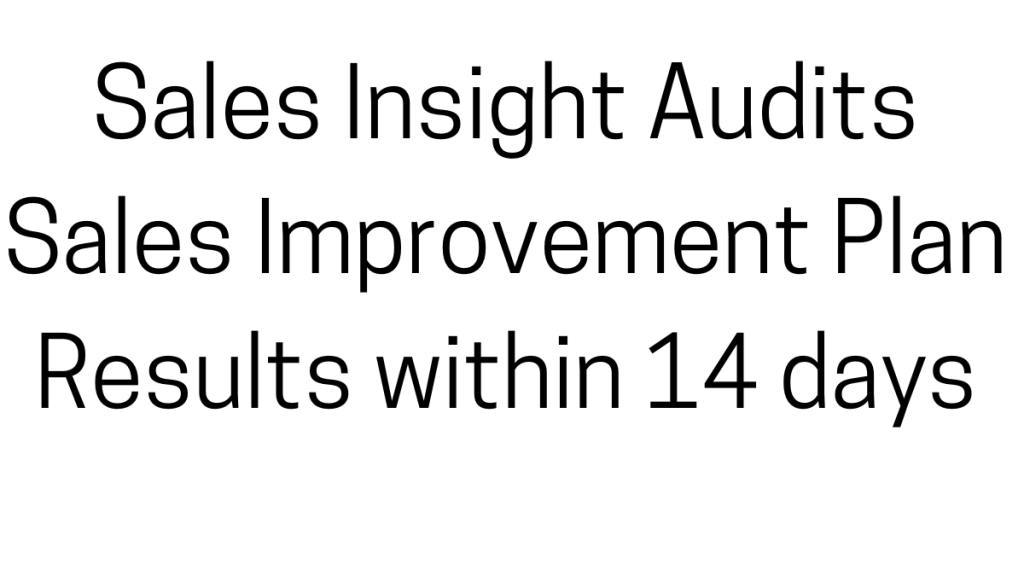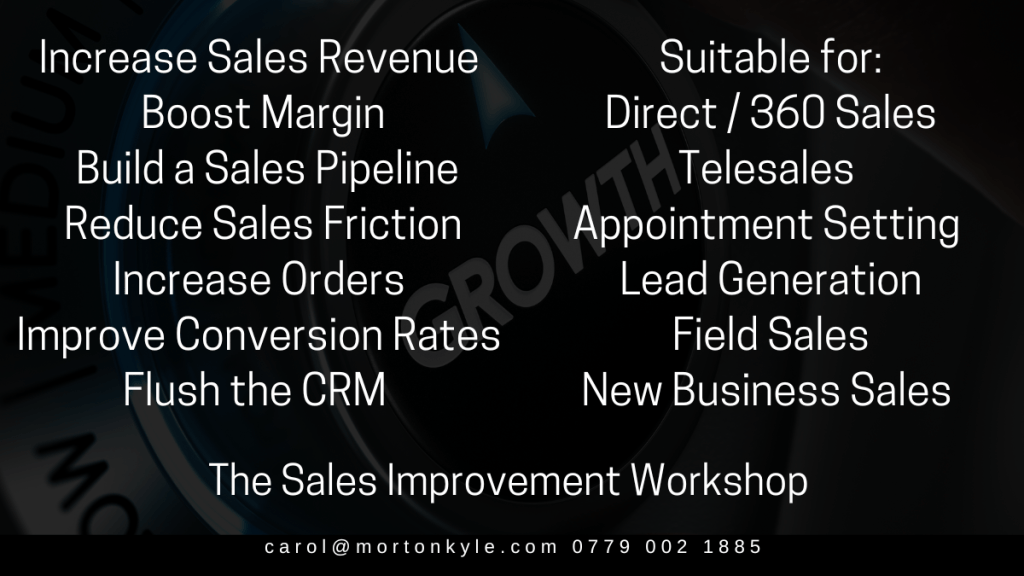Field Sales Training is a high risk activity!
For lots of reasons:
The Field Sales function is an expensive function, not least because of the cost to recruit and hire but because of their position in the sales life cycle.
Any sale that slips away at the stage that field sales is involved has typically already accrued a high sales acquisition cost. This makes any loss doubly expensive,
They may already be highly skilled and very experienced in their field, so training them in aspects of sales practice that they already know is disrespectful, demotivating and is likely to have an adverse kick back for all involved.
Taking Field Sales out of the field for any length of time can have a serious short and longer term impact.
Keeping these things in mind, when you’re looking for Field Sales Training, here are a few things you’ll want to consider:
That’s why – in The Sales Improvement Workshop we have a solution that’s tailor made for Field Sales Consultants. It’s a sales training course designed to help your field sales team sell more, to increase conversions, sales revenues and margin.
As part of that, let’s look at how we boost the ROI in our Field Sales Training with some handy pointers you might want to consider…
10 Ways to Boost the ROI in Field Sales Training.
#1 Long Term Impact
Consider the long term impact of the sales course.
Does it support the sales leadership team in knowledge transfer and continuous sales improvement such that it future-proofs the learning opportunities?
If not, it’s a ‘sheep dip’ sales training course…
#2 Perfect Format
What’s the perfect format?
Think about how much work and study can be done pre-course and post course, in order to ensure maximum impact when out of the field/selling mode.
Having a team of Field Sales people sat in a classroom is expensive.
Being out in the field doing side by side coaching, is often an option.
Using pre and post sales call analysis/coaching can be a much cheaper option in the long run with a much larger ROI.
#3 Content
How will you ensure the training is not covering elements of selling that the team are already good at?
Be cautious if the training content isn’t created based on indepth evaluation.
As a minimum, evaluating the sales performance of the individual attendees over the last 12 months.
Millions and millions of training hours are simply wasted every month by teaching sales stuff that the sales team already know.
Don’t tolerate any content that isn’t based on an identifiable gap in the sales results that are specific to your team.
Sales is a science, sales course design is based on gap analysis and solution.
#4 Feedback
What feedback loops are built into to the training to support continuous improvement in the training?
What informal and formal feedback routes are there?
Who manages the feedback loops?
Who ensures the feedback is digested and implemented where necessary?

#5 Evaluation
What will be the critical success factors?
How will you know the field sales training has been successful?
What key performance indicators will you use and over what period will you assess theses?
What provision is in place with the training provider if these critical success factors are not achieved?
Think about these things now.
Before the training kicks off…
Because once the field sales training is delivered it’s much tougher to have these important conversations, benchmark what success looks like and set agreeable standards.
#6 Ownership
Who will own the field sales training course internally?
Who will be critical in ensuring the key learning will be implemented?
How will you monitor habits, activities, mindsets, ensuring attitudes post training?
How will you future proof this investment?
#7 Inclusion
How much say will the sales team have in the content, the format of the field sales training?
What’s the consultation on getting their buy-in on the success measurements associated with the field sales training?
Surely if the sales team are being invested in, and an improvement needed, allowing them to have a meaningful voice in the design, content and projected up lift in sales results is a must to ensure proactive buy in?

#8 Focus
Ok, so the field sales training has been planned, created, and delivered, now, what else needs to change to ensure the team is a fertile unit to grow the extra sales?
For some this might be working on looking at the over arching sales goals.
For others it might be improving communication in the team.
In others it’s about introducing more regular sales coaching sessions.
Other teams may benefit from informal weekly performance management reviews or tailoring individual sales performance plans.
If you’re expecting the field sales training alone to bring about the change in sales results you need – don’t!
Instead, save your money, and certainly don’t believe anyone who tells you any differently.
#9 Follow Up
Look at the Ebbinghaus Effect.
Quite simply, up to 80% of any new information is forgotten very quickly.
So, what’s 80% of your spend of the Field Sales training course?
As a number, it’s very important…
It’s important because that’s what you’ve just wasted from your training budget.
It’s a number you will see absolutely no value from unless your trainer has some fairly intensive training follow up program built into the course.
You’re paying 100% of the training fee, miss the follow up and you loose 80% of the effectiveness.
But you still pay 100% of the training fee.
It’s the wrong time and place to skimp on budget, but if you’re training provider isn’t talking about a follow up plan to embed the learning, run out of the room.
Quickly.
#10 Industry Appropriateness
You don’t need the Field Sales trainer to come from your industry.
You don’t.
But you do need a field sales trainer who is prepared to immerse themselves in your firm.
Someone who can go deep on your sales results and sales function.
And having done that, go out and scout your competitors.
Their understanding and application is worth more than any industry experience.
I’ve been able to take working practices from tyre manufacturers and use them very successfully inSports equipment firms.
Cross pollination of working solutions is invaluable. So do your sales team a favour and look for depth of immersion and broad scope of experience and industry.
After all, do you really want to hook up with someone who is simply hawking your best practice to their next client win, your competitor?
No, I didn’t think so…

Summary: Field Sales Training and Getting the Biggest ROI
The above is not an exhaustive list.
It’s a list to get you started on some of the key questions you should be thinking about before deciding the best field sales training for your team…
Questions to ask before you decide to make the investment you’ll need to make in order to dramatically improve sales results.
Field sales training is critical to any business.
Any business that’s after beating the competition.
Where sales teams are pushing ahead, striving for continuous sales improvement.
Eager for an element of competitive advantage.
Because sales and purchasing are changing at rapid paces.
Buyers are radically rethinking their buying habits.
Prospects more elusive than ever.
Loyalty can be won and lost in a heartbeat.
Aversion to risk continually challenges even the best field sales teams.
Carefully constructed field sales training can help combat many of these.
Really good Field Sales training will restore best practice to the team and allow the sales leadership team to reset and reinvigorate sales performance.
For more information or simply to find out about our extensive range of sales training courses including The Sales Improvement Workshop – you can call Carol on 0779 002 1885
Sales improvement….
Comes in all shapes and sizes at Morton Kyle.
You can check out some of our other business improvement training courses here:
Simples Sales Forecasting – this is perfect if you have an overstuffed and messy sales CRM, you’re struggling with long sales cycles and poor deal management and/or sales forecasting is a bit of a hit and miss exercise with the sale handfuls of names getting bumped monthly.
The Sales Improvement Workshop – solving real world sales problems. Stopping all sales professionals from dropping the sales revenue they could be pocketing every single day!
Sales Insights Audit – our sales audit service designed to help you identify and repair leaks in the new business development and the account management process, the sales forecast, sales pipeline and revenue flow – this means you get a fully prepared action plan to unlock the sales potential in your sales function.

Whatever sales improvement solution you need, whatever sales challenge you’re facing – let’s have a chat…
If you’re looking for help in delivering a field sales training course for B2B sales professionals, I’d be happy to explore this with you and show you some of the work we’ve done with other field sales functions.


Who am I?
I’m Carol Griffiths, and I’ve spent the last 30+ years in the trenches of sales—fixing broken pipelines, rebuilding underperforming teams, and helping businesses close more deals at higher margins.
I’ve worked with global brands, challenger firms, and fast-growth sales teams, helping them:
✔ Fix underperforming pipelines – turning ghosted leads into closed deals.
✔ Increase win rates – without discounting or chasing bad-fit prospects.
✔ Build sales systems that actually work – so you don’t waste time on ‘busy work’ that doesn’t convert.
I’m not another ‘sales trainer.’ I don’t teach theory. I fix sales problems – fast. And if you’re still reading, it means you’ve got a problem that needs fixing.
I know how sales leaders think because I’ve been one. I know what the board wants because I’ve sat in those meetings.
And I know what works – because I’ve done it, tested it, and proved it across industries, markets, and economic downturns.

